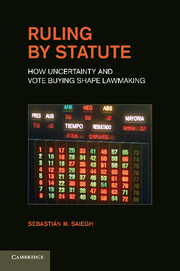Book contents
- Frontmatter
- Contents
- List of Figures
- List of Tables
- Acknowledgments
- PART I INTRODUCTION
- PART II THEORETICAL FOUNDATIONS
- PART III EMPIRICAL IMPLICATIONS
- 4 Measuring Chief Executives' Statutory Performance
- 5 Patterns of Statutory Policy Making Around the World
- 6 Political Prowess or “Lady Luck”?
- 7 Buying Legislators
- 8 Electoral Rules and Lawmaking
- PART IV NORMATIVE IMPLICATIONS
- PART V CONCLUSIONS
- PART VI APPENDICES
- Bibliography
- Index
8 - Electoral Rules and Lawmaking
Published online by Cambridge University Press: 03 May 2011
- Frontmatter
- Contents
- List of Figures
- List of Tables
- Acknowledgments
- PART I INTRODUCTION
- PART II THEORETICAL FOUNDATIONS
- PART III EMPIRICAL IMPLICATIONS
- 4 Measuring Chief Executives' Statutory Performance
- 5 Patterns of Statutory Policy Making Around the World
- 6 Political Prowess or “Lady Luck”?
- 7 Buying Legislators
- 8 Electoral Rules and Lawmaking
- PART IV NORMATIVE IMPLICATIONS
- PART V CONCLUSIONS
- PART VI APPENDICES
- Bibliography
- Index
Summary
The previous chapter examined how governments incentivize legislators to support their policies in inchoate party systems. Because individual legislators cannot be controlled through a party machine and a party-trained electorate, governments tend to use monetary payments to buy votes. In contrast, governments with institutionalized party systems can employ a variety of institutional tools to obtain party loyalty. Specifically, party leaders can exert influence on legislators' behaviors by two avenues: (1) the prospect of nomination; and (2) ideological screening (Londregan 2002). To understand how partisan resources can work as a substitute for outright bribery, this chapter focuses on candidate selection and ideological cohesion, seeking to understand the manner in which party leaders use the carrot of advancement and the stick of nonadvancement to impose a certain degree of “party unity” on their legislators (Carey and Shugart 1995; Mainwaring 1998; Morgenstern 2004).
I go on to examine the impact of selection rules on legislative behavior. The first section focuses on nomination rules and demonstrates that party leaders can use their control over ballot access to reward voting loyalty and punish legislative dissent. The evidence also indicates that lack of party unity may allow chief executives to form policy coalitions with dissenting opposition legislators, but may also deprive them of support from members of their own party. The aggregate, cross-national level of analysis lends external validity to these findings.
- Type
- Chapter
- Information
- Ruling by StatuteHow Uncertainty and Vote Buying Shape Lawmaking, pp. 133 - 154Publisher: Cambridge University PressPrint publication year: 2011



